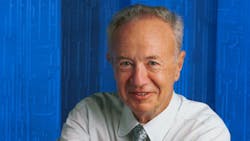Andy Grove, Intel Boss, Silicon Valley Teacher, Dies at 79
When Steve Jobs and Larry Ellison told Andy Grove he was the only person in Silicon Valley who they would willingly work for, he told them he wouldn’t have hired either because they were “a couple of flakes.”
He was at least half serious and didn’t crack a smile.
“It didn’t matter,” said Ellison, the founder of Oracle Corp. “Both Steve and I admired and respected Andy. We enjoyed all of our precious time with him, including the memorable and characteristic abuse.”
The dinner conversation between three of the most famous men in the history of the technology industry illustrates the effect that Grove, who died Monday at 79, had on the rise of Silicon Valley.
The Hungarian-born refugee was one of the founders of Intel Corp., the semiconductor company. He helped build it up it from a 1960s startup to the world’s largest chipmaker, a title it still holds. Grove, who literally wrote the book on how to handle corporate crises with “Only the Paranoid Survive,” also broke new ground by making Intel a household name. And he had as much impact on his industry as a mentor to many of Silicon Valley’s elite – from Ellison and Jobs to Facebook’s Mark Zuckerberg.
“Andy and I got to collaborate on several projects, and I never stopped learning from him,” said Microsoft co-founder Bill Gates. “He was at the forefront of creating the personal computer industry, and whenever we spent time together, I always came away impressed by his brilliance and vision.”
Growing Up in Pre-War Budapest
Before he achieved success and fame in his adopted country, the man born Andras Grof in Budapest on Sept. 2, 1936, had to endure some of the worst of Europe in the middle of the last century. He grew up in a middle-class Jewish family in Budapest.
In his autobiography “Swimming Across,” he described a fairly idyllic early life that was soon thrown into turmoil. During World War II, his father was conscripted into a Hungarian army labor battalion and taken off to the Russian front, where he was reported lost. After the Nazis invaded in 1944, he hid with Christian families under a false name and narrowly escaped a sweep of the countryside that eradicated Hungary’s Jewish population outside of its capital — about half a million people.
A Teacher
It’s difficult to overstate the respect Grove commanded among Silicon Valley’s elite. He was a huge influence on the famously headstrong Jobs. When Jobs failed to impress Intel executives with his funding pitch in the earliest days of Apple, Grove chose to personally invest in the company. When he was deciding whether to return to Apple after he was ousted, Jobs sought out Grove’s advice.
Throughout his life, Grove kept making time for new generations of Silicon Valley’s executives on their way up, acting as a mentor and challenger of assumptions for people like Zuckerberg and Dropbox’s Drew Houston.
“I first met Andy after a series of pretty hard times at Facebook when a lot of people in his position wouldn’t take the time to see me,” Zuckerberg recounted as part of the Churchill Club’s award presentation. “He was always so generous.”
Even his failing health was turned into a learning tool for others. When Grove was treated for prostate cancer in the mid 1990s, he wrote about the experience in a 1996 Fortune magazine cover article. He went on to lobby for changes in medical research and the use of information technology in the health-care industry, turning his personal frustration into a call to action. In January 2008, he promised to bequeath as much as $40 million to the Michael J. Fox Foundation, a group created by the actor to seek a cure for Parkinson’s disease. Grove was diagnosed with it in 2000.
Even in retirement, he wasn’t content to make the rounds receiving awards and living on past achievements. His public appearances always had a point. When he received his Churchill Club Legendary Leader Award in 2015, he struggled onto stage, took the microphone and urged the audience to help out refugees.
“I made it,” he said. “Let’s help in a little way to help them make it.”
Grove is survived by his wife Eva Kaston, who he married in 1958, and two daughters.
By Ian King
About the Author
Bloomberg
Licensed content from Bloomberg, copyright 2016.
